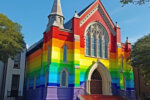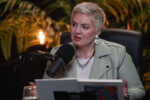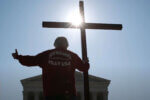This emphasis on our helplessness is found over and over in the writings of Christians in other eras. For instance, in that little jewel of a 17th-century book, Brother Lawrence’s Practice of the Presence of God, helplessness was the hinge on which turned the Carmelite lay brother’s relationship with God:
“That when an occasion of practicing some virtue offered, he addressed himself to God, saying, ‘Lord, I cannot do this unless Thou enablest me’; and that then he received strength more than sufficient.
“That when he had failed in his duty, he only confessed his fault, saying to God, ‘I shall never do otherwise if You leave me to myself; it is You who must hinder my falling, and mend what is amiss.’ That after this he gave himself no further uneasiness about it.”
Though few of us have Brother Lawrence’s maturity, nevertheless sometime in life every one of us finds himself out of control, caught in circumstances he is helpless to change. When this happens, welcome such times! Often it is only then that we lesser spirits enter into the truth of Jesus’ statement, “‘Without Me you can do nothing'” (John 15:5).
With helplessness alone, one would be like a bird trying to fly with one wing. But when the other wing of God’s adequacy is added to our helplessness, then the bird can soar triumphantly above and through problems that hitherto have defeated us.
I have always been impressed by the story of Dr. A.B. Simpson, the famous New York preacher. Poor health had haunted this man. Two nervous breakdowns plus a heart condition led a well-known New York physician to tell him when he was only 38 that he would never live to be 40.
The physician’s diagnosis underscored the physical helplessness that the minister knew only too well. Preaching was an agonizing effort. Climbing even a slight elevation brought on a suffocating agony of breathlessness.
In desperation, sick in body and despairing in spirit, Dr. Simpson went at last to his Bible to find out exactly what Jesus had to say about disease. He became convinced that Jesus had always meant healing to be part of His gospel for the redemption of man’s total being.
One Friday afternoon soon after this revelation, Dr. Simpson took a walk in the country. He was forced to walk painfully, slowly, for he was always out of breath. Coming to a pine woods, he sat down on a log to rest. Soon he found himself praying, telling God of his complete helplessness with regard to his physical condition.
But to this helplessness he added his belief that God was “for health” all the way. It was that majestically powerful combination again, “My total inadequacy, Your perfect adequacy.” He then asked Christ to enter him and become his physical life, for all the needs of his body, until his life’s work was done.
“There in the woods,” he said later, “I made a connection with God. Every fiber in me was tingling with the sense of God’s presence.”
A few days after that, Simpson climbed a mountain 3,000 feet high. “When I reached the top,” he related joyfully, “the world of weakness and fear was lying at my feet. From that time on I had literally a new heart in my breast.”
And so he did. During the first three years after this healing he preached more than a thousand sermons, conducting sometimes as many as 20 meetings in one week. His testimony was that never once did he feel exhausted. For the rest of his life he was noted for the amazing volume of his sermonic, pastoral and literary work. He lived to be 76.
Simpson’s work, moreover, has lived after him. The Christian and Missionary Alliance, which he founded, is still a potent spiritual force today; his books are still being published and are blessing millions.
Why is prayer so startlingly effective when we admit our helplessness? First, as we have seen, because God insists upon our facing up to the facts of our human situation. In addition, this recognition and acknowledgment of our helplessness is the quickest way to that right attitude so essential to prayer. It deals a mortal blow to the most serious sin of all—man’s independence that ignores God.
Another reason is that we cannot learn firsthand about God—what He is like, His love for us as individuals, His real power—as long as we are relying on ourselves and other people. And fellowship with Jesus is the true purpose of our lives, the only foundation for eternity.
So if your every human plan and calculation has miscarried, if, one by one, human props have been knocked out and doors have shut in your face, take heart. God is trying to get a message through to you, and the message is: “Stop depending on inadequate human resources. Let Me handle the matter.”
Here are three suggestions for presenting to Him what I call “the prayer of helplessness.”
First, be honest with God. Tell Him you are aware of the fact that in His eyes you are helpless. Give God permission to make you feel your helplessness at the emotional level, if that is what is needed. Recognize that this may be painful! There is a good psychological reason, however, why it may be necessary. Unless the power of our emotions is touched, it is as if a fuse remains unlit.
Second, take your heart’s desire to God. You have accepted your helplessness. Now grip with equal strength of will your belief that God can do through you what you cannot. It may seem to you for a time that you are relying on emptiness, dangling over a chasm. Disregard these feelings and thank God quietly that He is working things out.
Third, watch for opening doors. When the right door opens, you will have a quiet, inner assurance that God’s hand is on the knob. That is the time of action for you, an opportunity for your creativity to join hands with His.
One sunny day in the future, you will look back and your heart will overflow with praise to God that He cared about you enough to shut you up to Him alone. Without that stringently kind providence, you could never have learned firsthand the amazing benefit of helplessness.
Catherine Marshall (1914-1983) was one of America’s most beloved authors. She wrote two novels—Christy and Julie—and numerous inspirational works. She and her second husband, Leonard E. LeSourd, along with John and Elizabeth Sherrill, founded Chosen Books in 1972. Adapted from The Best of Catherine Marshall, edited by Leonard E. LeSourd, copyright 1993. Published by Chosen Books. Used by permission.






Leave a Comment
You must be logged in to post a comment.